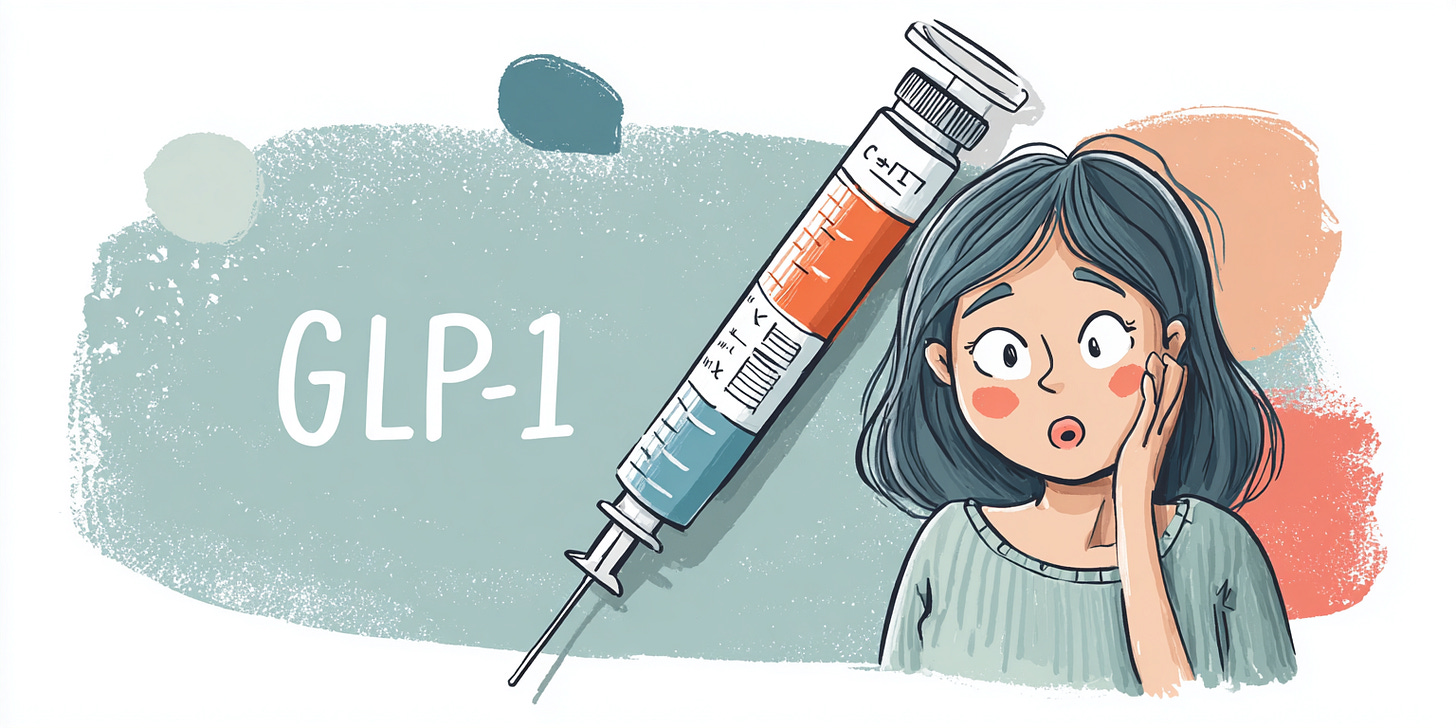GLP-1 And Weight Loss: The Full Truth Your Body Deserves
Weight Loss With GLP-1: What Most People Miss
You've probably heard the buzz about medications like Ozempic, Wegovy, Zepbound and Rybelsus.
You may even have someone in your life taking these medications or remember the headlines about the dramatic weight loss people are having.
However, with great power comes great responsibility. It's important to understand the mechanism behind these medications, why they are used, and how to use them responsibly.
Here’s the Thing Hardly Anyone Talks About
Think about driving a car. You press the gas pedal, maneuver left and right, and then, when it's finally time to slow down or stop, you press the brake pedal.
Your body has a similar system for food.
When you eat, and particularly after a large meal, there is a hormone secreted from your gut called GLP-1 that is very powerful.
You could think about GLP-1 as your body's natural appetite braking system. And it is not a panic stop—it is a smart, discerning deceleration system.
GLP-1: What Does This Natural "Brake" Do?
Slows digestion: It tells your stomach to slow down. It is like a traffic director making sure that everything is absorbed well, and preventing a “sugar rush” after you eat.
Wakes up insulin: When sugar enters your bloodstream, GLP-1 gives your insulin a friendly reminder to do its job. Insulin is the key that opens the door to your cells to let sugar in for energy. GLP-1 makes sure insulin gets to work.
Signals brain: It sends a direct message to the brain's "control tower" saying, "Okay, we have plenty of fuel on board, you can lay back, stop looking for food, and relax." The brain's response helps reduce some the urge to want food and lessens that constant "hungry" feeling.
In summary, GLP-1 helps create a feeling of calm and control after your meals.
The "Bottled" Brake: What GLP-1 Medications Do
This is where things start to get really interesting. Researchers discovered how to bottle that feeling—the sense of calm, fullness, and satisfaction—and turned it into a medication, available as an injection or, in some cases, a pill.
They are essentially an upgrade of your car's natural brake system:
More potent signal: They create a stronger signal to your brain, a signal that is "we're good on food" that is loudly accompanied by a lot of blinky lights.
Lasts longer: These medications last days, while your natural GLP-1 is gone in a flash, so you can maintain that feeling of "full".
These medications were developed for people with Type 2 Diabetes to keep their blood sugar in check, when a fantastic secondary effect began to appear: weight loss.
They have truly changed lives, allowing large portions of individuals to lose 15-20% of total body weight, about the same as some weight-loss surgery, while reducing the risk of many obesity-related health issues.
The Hidden Trade-Off: Losing Muscle with Fat
At the most recent ENDO 2025, the annual meeting of the Endocrine Society in San Francisco, the findings of a recent study showed a surprising fact: roughly 40% of the weight lost may be lean muscle and not fat1.
Older adults and women likely lose more muscle on semaglutide, both populations are already at heightened risk for sarcopenia (age-related muscle weight loss).
Though the study had a small sample size and more data is needed, the study does highlight a potentially concerning side effect that requires closer investigation.
Think about your body like a house. When you lose weight, you want to get rid of the excess "clutter" (as in excess fat) that slows you down. But if you are also taking down healthy walls and support beams (as in muscle), you risk the integrity of your house in the process.
Sarcopenia: Why It Matters to You
You may think of muscle as only the foundation for lifting weights, but it is so much more than that. Your muscle is like the forgotten superhero of the human body; the hidden force behind many of the body's essential functions including metabolism and mobility.
What happens when those forces start disappearing? That's when we begin to see the effects of sarcopenia.
Sarcopenia essentially refers to the age-related loss of muscle mass, strength, and function. If we think of our muscles as significant groups of bulk, we need also to view them as active tissue with meaningful function, like an engine of a car. As we age, or when we do not use our muscles enough (or worse, when we lose weight too rapidly), that engine begins to detract in size as well as power.
The point is, it is not simply about a nice physique, it is how those muscles and other important systems function day to day. Here is why it is extremely important to maintain your overall muscle mass for your health:
Your body's heat generator: Muscles are a metabolic machinery. Think of muscle as an internal furnace; it burns calories continuously, regardless of whether you're moving (and if you're working out, you burn even more). More muscle = a more efficient furnace, which means better long-term weight control, and hopefully less weight regain. Lose muscle? You've essentially lowered your metabolic thermostat. Your body will have a much more difficult time holding onto new weight.
Blood sugar reservoir: Muscle acts as your body's primary storage location for glucose (sugar) from your circulatory system. Think of muscle as a "sugar sponge." When you have good muscle mass, your body is much better at soaking up sugar, which is vital for regulating blood sugar levels. This reduces the chances of developing or worsening Type 2 Diabetes.
Your personal GPS for independence: Muscle is what allows you to walk upstairs, lift groceries, play with your grandchildren, and simply go through life aiming to achieve your goals. As we age, preserving your muscle mass will diminish the risk of falls and therefore serious injury.
Bone builders: Muscle provides movement, but muscle also speaks to your bones. When your muscles contract against bone, it is putting pressure on your bones, which tells the bones to become stronger and denser. The communication between muscle and bone means that strong muscle = strong bone and a reduction in conditions like osteoporosis and fractures.
Immune system's ally: They hold all the amino acids your body needs to be able to make new immune cells and antibodies. When you are sick or you undergo stress, your body will start to use the amino acids in your muscles. A well-built muscle base has another friend for your immune system.
Overall vibrancy: Having enough muscle mass just adds to the amount of time you feel energetic, vibrant, and having real capacity. You can keep doing things you enjoy, continue living independently, or at least live and experience the best that life can possibly offer.
You can even decrease your metabolism in the longer term as you age by losing too much muscle, which makes maintaining weight loss harder. You also increase your chances of feeling frail or getting hurt, which is why it is so important to protect your muscle during weight loss.
Beyond Muscle Loss: What Else to Expect
But that's not all. Use as with any medication, a GLP-1 agonist can experience other side effects. Most people do quite well, however it is important to know about the most common side effects, especially when you are initially starting or upping the dose.
Imagine your digestive system as a busy highway. When you start a GLP-1, it's as though you have slowed traffic in some lanes. As a result, you may run into:
Upset stomach: nausea (queasy), vomiting or constipation are very common, particularly when initially starting the medication. Commonly the body may adjust over time, but that doesn't make things more comfortable for a period of time.
Heartburn/indigestion: Since digestion is slowed by the class of medication, some people experience more heartburn or fullness/ discomfort in their stomach per se.
Gallbladder problems: This less common but serious side effect indicate the risk of gallstones or gallbladder inflammation may be slightly increased in some people.
Injection site reactions: Most of these are injections, so some people experience redness, itching, or soreness at the injection site.
It is of utmost importance that you discuss with your doctor, any side effects you encounter. They will be able to help you manage the side effects, adjust your dose, or look for other options.
Questions to Ask Yourself
It's essential to recognize that while GLP-1 is what our bodies naturally produce, and there are medications that mimic GLP-1's effort, they're still not a wonder drug, and they are not for everyone.
Sometimes, we get a new medication that offers tremendous benefit and we are quick to think of it as an "easy button." It becomes a band-aid, not a solution, if habits stay the same.
While medications that engage the GLP-1 signals in your body are great tools, they work most favorably when you are building a reliable foundation.
So if you are starting or have started a GLP-1 medication, ask yourself these questions personally:
What healthy habits am I willing to commit to alongside this medication? While the medication can grant you an "advantage", you will still have to "navigate" the path.
Am I ready to be a partner with my doctor and healthcare team? Your healthcare team will be the best people to help you understand how these medications fit into your overall health and to address any questions or concerns you identify along the way.
Am I ready to view this as a long-term collaboration with my body, rather than a quick fix? These medications facilitate your body doing what it's designed to do even better but they are not an alternative to mindful eating.
Always remember, any medical treatment or medicine should be discussed in depth with your doctor. They can help you determine whether these are appropriate options if your unique health situation and whether or not you should pursue them going forward.
Keep It Off: The New Chapter Without GLP-1 Shots
Here’s what most people don’t know: There are research-backed natural strategies to naturally boost GLP-1.
In this week’s post, you’ll discover:
8 Natural strategies to raise GLP-1 without meds
How to maintain muscle during weight loss, specially important for older adults and women, a group at higher risk for sarcopenia (age-related muscle loss)
Plant-based sources of complete protein and combinations of plant-based foods to obtain complete protein
A downloadable ebook with quick and delicious, high-protein recipes to support muscle maintenance—featuring Mediterranean, vegan, vegetarian, anti-inflammatory, ketogenic, DASH and MIND diet options
Official recommendations for weight loss
A fitness tracker to help protect muscle and build healthy weight loss habits
What to discuss with your doctor before starting or stopping GLP-1 medication for weight loss
Unlock the full post below by upgrading to a paid subscriber.



